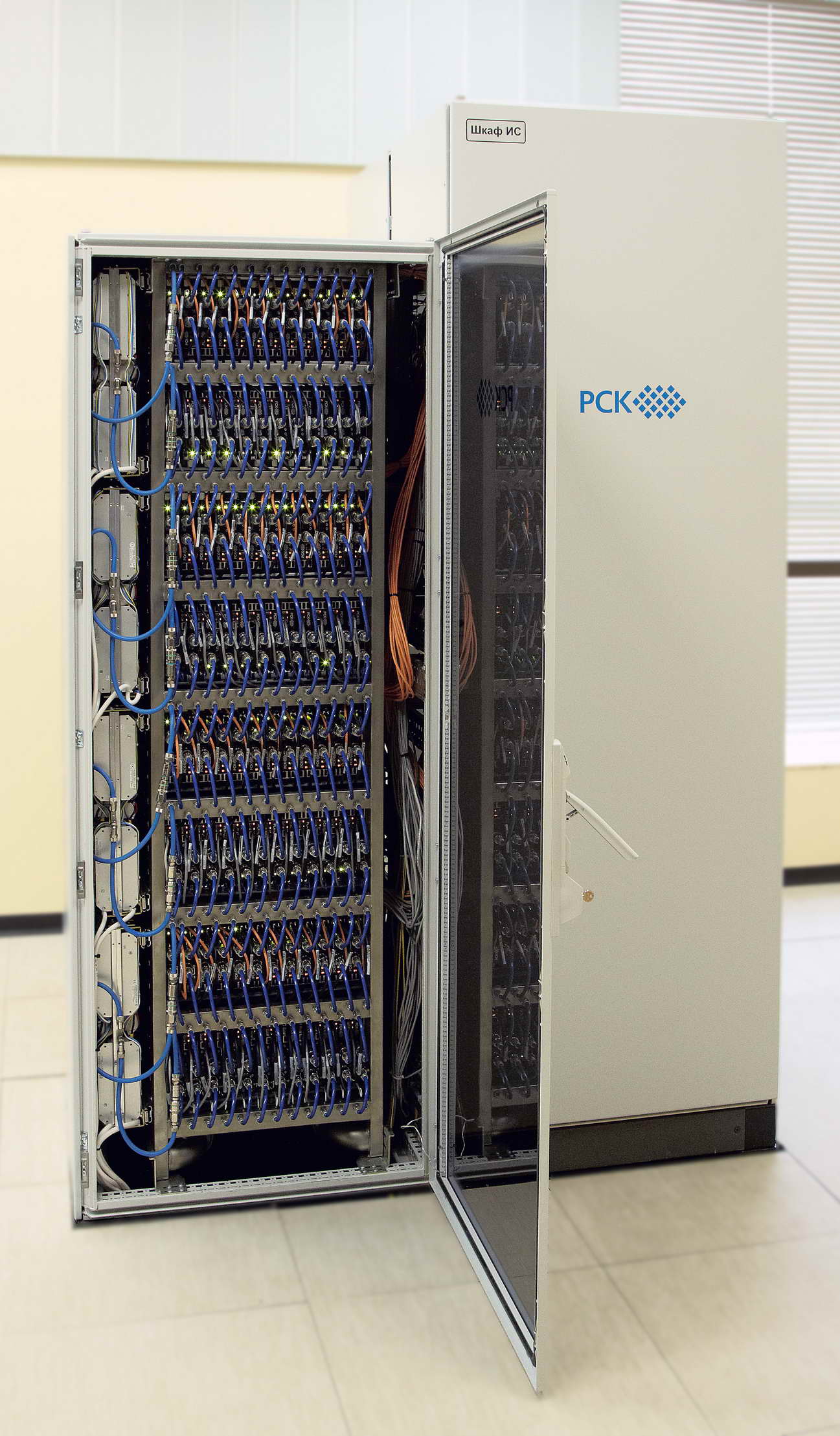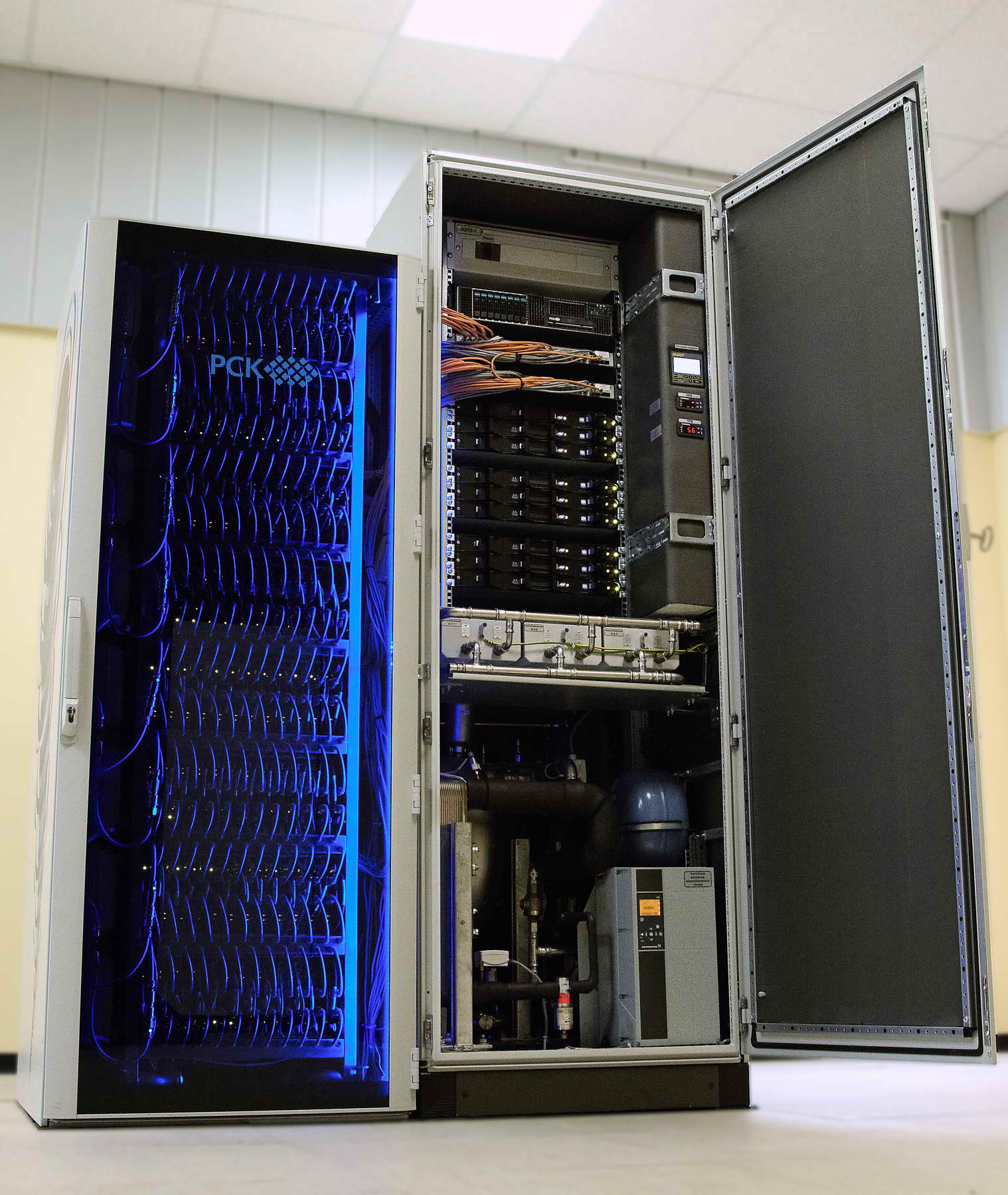Moscow, October 27, 2011 — Russian Federal Service for Hydrometeorology and Environmental Monitoring (Roshydromet), RSC Group and Intel Corporation introduced a new energy efficient high-performance cluster built on the basis of Intel® Xeon® 5600 Series Processors and liquid cooling. RSC Group developed the technology solution and acted as an system integrator of the pilot cluster system with the peak performance of 15.33 TFLOPS (trillion floating point operations per second) and a possibility of further extension. The high-performance solution is a tool for Russian meteorologists to further develop operational technologies in order to improve accuracy, shorten the lead time and increase refinement of weather forecasts.
Today, Roshydromet solves a wide range of complex tasks in hydrometeorological data processing, simulation and forecasting of processes in the atmosphere and ocean that require a lot of processing resources and their highly efficient utilization. Meteorological center in Moscow, together with centers in Washington and Melbourne, is one of three World meteorological centers of the World Meteorological Organization (WMO). By working with WMO the World meteorological center in Moscow ensures fulfillment of Russia's international obligations for forecasting information and hydrometeorological survey data exchange.
A computing system with a total peak performance of 27 TFLOPS commissioned by Roshydromet in March 2009 allowed the scientists of Hydrometcenter of Russia (unit of Roshydromet) to unlock the scientific potential of predictive model development that existed at that time. As the use of global models in 30 to 40 km increments and mesogrid models in 2 to 7 km increments continues to grow exponentially in the operational practice, the existing computing cluster almost depleted its computing resources.
"To increase accuracy and refinement of weather forecasts it is necessary to increase spatiotemporal resolution of models and their physical saturation. Presently, scientific feasibility of atmosphere process simulation allows completing these tasks with the computing power of about 0.5 PFLOPS (five hundred trillion floating point operations per second). The lack of such computing capacity limits the scientists and experts of the Hydrometcenter of Russia”, said Roman Vilfand, Director at Hydrometcenter of Russia.
"As we prepare for the next stage of modernization to increase the computing power 10 to 15 times, we need a solution that meets ever-increasing requirements of energy efficiency in the conditions of significant limitations as to availability of electric power and the need to cut other operational expenses", said Vladimir Antsypovich, Director at Roshydromet Main Computer Center (МСС). “A high-performance RSC solution based on Intel® Xeon® 5600 Series Processors and liquid cooling is highly compact, has low power consumption and provides opportunities for further performance increase and scalability, ensures high reliability, so it meets Roshydromet’s rather strict requirements for today’s computing systems”, he added.
Creating an innovative Roshydromet’s computing cluster
RSC Group, Russia's and CIS leading full-cycle developer and integrator of next-generation supercomputing solutions based on Intel architecture and advanced liquid cooling, preformed thorough modernization of equipment supplied under a contract with Roshydromet MCC, bringing it to the level of a pilot system with current peak performance of 15.33 TFLOPS.
Roshydromet's new computing cluster is based on an innovative architecture RSC Tornado developed by RSC and first demonstrated at the Europe’s leading industry event, International Supercomputer Conference (ISC) in Hamburg, June 2011. RSC Tornado is the world’s first energy efficient supercomputing solution with advanced liquid cooling for generally available standard server boards based on Intel® Xeon® processors initially designed for traditional systems with air cooling of electronic components. RSC Tornado architecture ensures flexible configuration of computing nodes with standard interfaces, simple creation of a solution, high serviceability (simple replacement of RAM modules and RAM extension, as well as processor upgrades), capability of integration with any external products having standard PCI Express interfaces.
Presently, the pilot cluster system installed at Roshydromet consists of 96 computing nodes, each of them including two high-performance Intel® Xeon® 5680 Series Processors 3.33 GHz (192 processors in total). The system has large capacity of RAM per node, 48 GB, (the total RAM capacity for the system is 4,608 GB). The communication network is implemented on the basis of high-speed Infiniband QDR interface. Yet on the stage of a pilot system, the computing cluster possesses the following unique characteristics:
• High energy efficiency. The system has an industry-record Power Usage Effectiveness (PUE) of less than 1.06 (this is the ratio of total power consumption vs. power consumption of electronic components). This means that maximum 5.7% of energy consumption will be used for cooling of the system;
• High computing density resulting in compact size;
• High computing effectiveness ratio – more than 92 % in LINPACK benchmark;
• Simplicity and high reliability;
• Cost effectiveness;
• High scalability
• Accelerator support (Intel MIC architecture).
“Innovative RSC Tornado architecture with advanced liquid cooling allowed to create Roshydromet’s computing cluster, which meets all stringent requirements for this type of system, and has truly unique characteristics: low power consumption level in combination with record-breaking energy efficiency and huge computing efficiency. The pilot project is of a strategic importance to us both because of technology innovations and further development prospects, as well as due to high social value of tasks being resolved by Roshydromet with the help of the new high-performance system", said Alexey Shmelev, Chief Executive Officer at RCS Group.
This year, as a part of the pilot project based on standard х86 architecture performance of the Roshydromet MCC computing cluster will be increased to 30 TFLOPS without changing the system size.
Since 2003, Intel corporation specialists participate in Roshydromet's activities on optimization of forecasting algorithms in high parallelism computing environments. In April 2008 Roshydromet and Intel Corporation announced the creation of Competency Center of High Technologies in Hydrometeorology. The goal of the Center is to conduct research in the area of application of computing structures in operational hydrometeorology and optimization of corresponding computing algorithms.
“Due to long-standing cooperation between specialists on both parts we optimized predictive models used by Roshydromet for cluster systems based on х86 architecture. This allowed to customize the computing system for current operational tasks within the shortest time. And the performance-leading Intel Xeon processors ensure that Roshydromet obtains additional computing performance to solve these tasks”, said Julia Klebanova, Enterprise Department Director at Intel in Russia and CIS.






